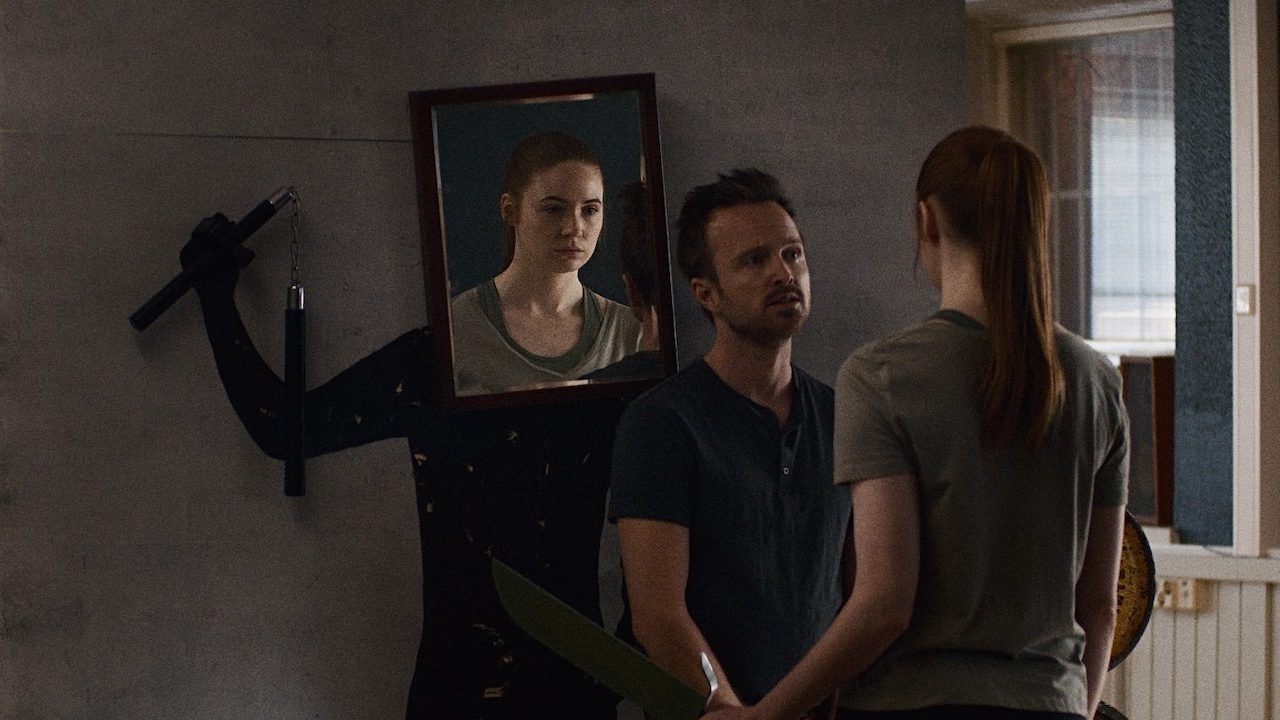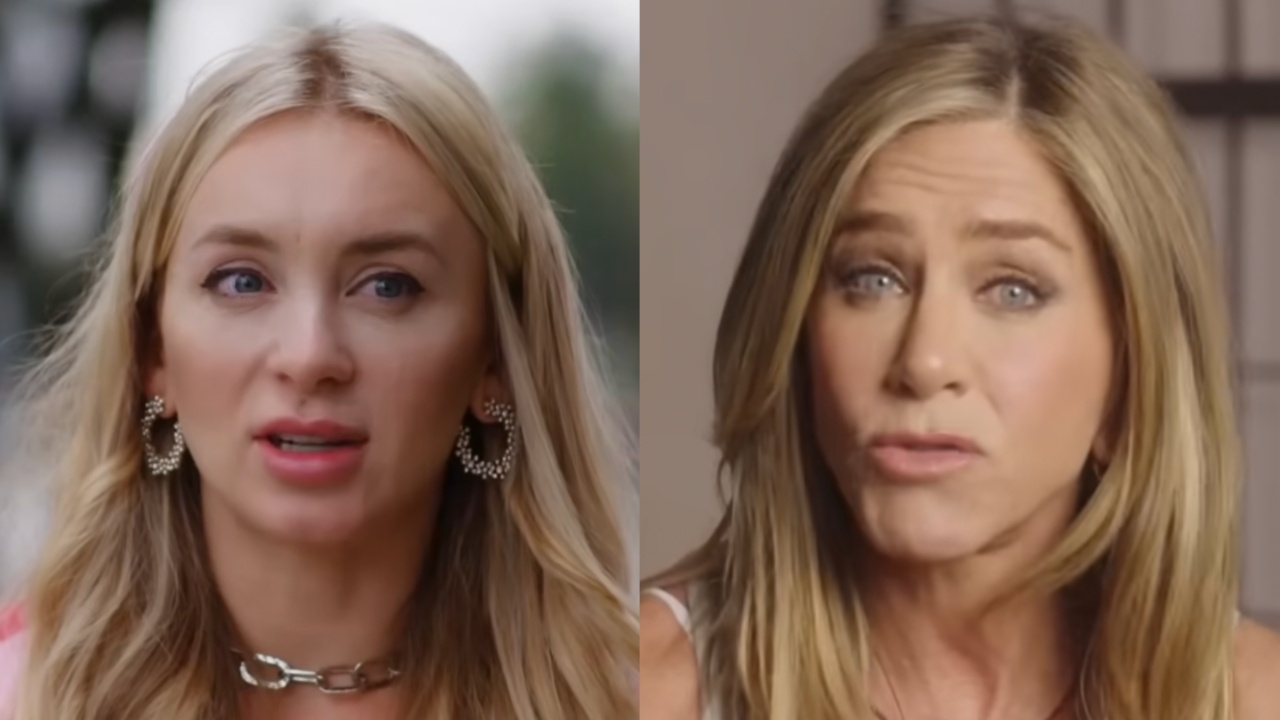The subject of cloning has been explored thoroughly in hit films such as Jurassic Park, The Prestige, The Island and Multiplicity, but Riley Kearns’ Dual still manages to stand apart – because this time it's real personal. Oftentimes we imagine the bigger picture of what it would be like if cloning was used on a larger scale in society, but this film scales it way back. And here’s the question at play: What if your clone was better and cooler than you in every way and proceeded to take over your life?
Dual centers on Karen Gillan’s Sarah, a somber woman who finds out she has a terminal illness and only months to live. In an effort to ease the pain of those she loves, including her boyfriend (Beulah Koale) and mother (Maija Paunio), Sarah decides to invest in a procedure called “replacement,” which will allow for a clone to live on after she is gone.
Sarah meets her clone and preps for her to take over her life, spending time with her and explaining her likes and dislikes. Months later the original Sarah starts to become obsolete in her own life – and then receives the news that she is no longer dying. Now living an independent life, Sarah's Double requests a "stay," and the protagonist is forced to literally battle herself (err… her other self) in a fight to the death. Talk about a stab in your own back.
While Riley Stearns’ film is rough around the edges, and likely to fall into love-it-or-hate-it territory among viewers, Dual’s offbeat execution of fascinating subject matter wins in the end.
The concept makes for a super clever sci-fi ‘what if’ about the future of cloning.
Dual premiered at the Sundance Film Festival early this year following the filmmaker’s prior under-the-radar comedies – 2019’s The Art of Self Defense and 2014’s Faults. Riley Stearns adds another small-scale dark comedy to his resume, but this is the first instance of sci-fi in his burgeoning career. In many ways, Dual feels like a lost episode of Black Mirror, which comes at the perfect time considering we’ve yet to see a new entry to the Netflix series for the past three years. Continuing to showcase a distinct voice, he has made a thought-provoking genre movie and a deadpan comedy all in one.
The movie has a smart setup, creating an atmosphere that doesn’t lean into a big bold future with flying cars or any overstatement to set the scene. Sarah’s world doesn’t look dissimilar to ours and we are only clued into her reality being different than our own when she finds a video introducing the cloning process. It’s easy to accept it considering how obsessed we are as humans to leave a mark or somehow live forever. Stearns sets up Dual's story nonchalantly and then proceeds to orchestrate a narrative that is creative and completely fucked up to see play out.
What is just as interesting as the idea of cloning ourselves to remain relevant after we die, is how it is just the entry point to how the movie unravels. In Dual, clones have rights too and the way that society has decided to deal with this conflict is a public fight to the death between them. With that, within its tight 95-minute runtime, Dual manages to make a bleak concept playful, and say something new about the battle we often fight with ourselves.
Your Daily Blend of Entertainment News
Dual is a pitch black comedy, sometimes to a fault.
Dual’s biggest double-edged sword comes in the form of Karen Gillan’s protagonist – the principal conflict being that the character is difficult to root for because of how monotone and do-nothing Sarah is. Her eccentricity is absolutely on purpose and in many ways helps the story move along and she deals with an uphill battle of being replaced within her life and finding new purpose. However, it’s also one of the film’s weaknesses because there are two of them, and neither are particularly likable.
Not many movies of this kind have tackled the types of insecurities that would come up if you were to be cloned. Imagine a version of you existing without the baggage of your past, insecurities or addictions, or the general weight of life? It's clear how a clone could be frustrating because you'd be looking at a version of yourself unscathed by the experiences that truly mold us.
There’s also an overall dreariness about Dual and its pitch black comedy that takes some time to get used to. The power of the concept is shaded with a grey tone. There is an unevenness about the execution of Dual that doesn’t wholly work because of the way its comedy rubs awkwardly against its bigger themes. Thankfully, Aaron Paul swoops in midway through the film to bring in some energy as Sarah’s trainer for her public showdown with her double. The film's best moments happen between Paul and Karen Gillan, and further engage Dual’s broader messages.
The way Dual plays out is unsuspecting, especially due to how affecting it becomes.
Just when you think you’ve figured out Dual, it sidesteps again, especially in its great final act. It’s almost as if Riley Stearns knows what you’ve seen from the comparative Black Mirror or even Hunger Games and wants to beat its own drum no matter what. Even if the more typical method of storytelling would have strengthened this movie, it seems as though the filmmaker was keen on paving his own path.
For how peculiar and hazy Dual can be, the movie is most impressive in its ability to find a unique course. Overall, Dual is entertaining and affective, and gets one’s head spinning with uneasiness about the oddly specific problems we may face in a world where cloning is an accessible science for our society to buy into. To the future, I guess. *gulp*

Sarah El-Mahmoud has been with CinemaBlend since 2018 after graduating from Cal State Fullerton with a degree in Journalism. In college, she was the Managing Editor of the award-winning college paper, The Daily Titan, where she specialized in writing/editing long-form features, profiles and arts & entertainment coverage, including her first run-in with movie reporting, with a phone interview with Guillermo del Toro for Best Picture winner, The Shape of Water. Now she's into covering YA television and movies, and plenty of horror. Word webslinger. All her writing should be read in Sarah Connor’s Terminator 2 voice over.

